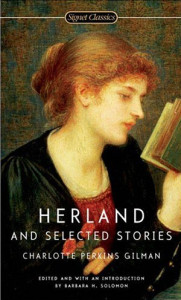 I generally prefer dystopian fiction to fictional visions of utopia, but sometimes you just have to try new things. Having seen Herland referenced pointedly by Jasper Gregory on Twitter (1,2,3) and offhandedly by Hanna Rosin in her recent book, it seemed worth checking into. As the book has been out of copyright for some time, it is readily available for free in various formats, including an audio book version from the volunteers at Librivox.
I generally prefer dystopian fiction to fictional visions of utopia, but sometimes you just have to try new things. Having seen Herland referenced pointedly by Jasper Gregory on Twitter (1,2,3) and offhandedly by Hanna Rosin in her recent book, it seemed worth checking into. As the book has been out of copyright for some time, it is readily available for free in various formats, including an audio book version from the volunteers at Librivox.
The book describes an isolated land composed entirely of white women who are mysteriously capable of giving virgin birth exclusively to daughters (the only truly fantastical plot device in the book) and have built for themselves a world free from war, crime, strife, cattle, dogs, abortion, racial diversity, and gender roles. Three male protagonists come across this land, are swiftly captured by the natives, and come to be educated in their language and customs. They stand in as proxies for three modes of how men can relate to women: forceful hypermasculinity (Terry Nicholson), worshipful chivalry (Jeff Margrave), and companionate partnership (Van Jennings). The last of these characters also serves as the narrator, making it fairly clear what sort of approach the author would prefer men to take.
After the first few chapters, this text does not serve so much as a conventional novel, having a plot that moves forward in dramatic fashion as the protagonists attempt to overcome some series of problems, but rather as a vessel for exposition of the author’s ideal vision of how society should function. (Readers and fans of Ayn Rand should be able to take this in stride.) Although it was penned nearly a century ago, some of these ideas will be quite familiar to modern feminists, for example, that gender roles are socially imposed, that women are perfectly capable of mental and physical exertion and all manner of useful work, and that social ills can be attributed to our civilization’s patriarchal power structures. Other ideas will seem rather foreign to modern feminists, such as the exaltation of motherhood as the highest good and the sharply disdainful treatment of abortion.
It caught me somewhat by surprise to find freethought mixed in with this feminist manifesto. I knew from reading Susan Jacoby’s Freethinkers that there was significant overlap between the suffragettes and the freethought movement of the late 19th and early 20th century, but I still wasn’t expecting a full-frontal assault against Christianity as a system of belief. This happens at a few points in the book, but most notably in chapter 10, when the narrator (Van) is trying to explain various Christian doctrines to his beloved Ellador:
This pleased her very much, and when I expatiated on the
Omniscience, Omnipotence, Omnipresence, and so on, of our God,
and of the loving kindness taught by his Son, she was much impressed.The story of the Virgin birth naturally did not astonish her,
but she was greatly puzzled by the Sacrifice, and still more by the
Devil, and the theory of Damnation.When in an inadvertent moment I said that certain sects had
believed in infant damnation–and explained it–she sat very
still indeed.“They believed that God was Love–and Wisdom–and Power?”
“Yes–all of that.”
Her eyes grew large, her face ghastly pale.
“And yet that such a God could put little new babies to burn
–for eternity?” She fell into a sudden shuddering and left me,
running swiftly to the nearest temple.Every smallest village had its temple, and in those gracious
retreats sat wise and noble women, quietly busy at some work
of their own until they were wanted, always ready to give comfort,
light, or help, to any applicant.Ellador told me afterward how easily this grief of hers was
assuaged, and seemed ashamed of not having helped herself out of it.“You see, we are not accustomed to horrible ideas,” she said,
coming back to me rather apologetically. “We haven’t any. And
when we get a thing like that into our minds it’s like–oh, like
red pepper in your eyes. So I just ran to her, blinded and almost
screaming, and she took it out so quickly–so easily!”“How?” I asked, very curious.
“`Why, you blessed child,’ she said, `you’ve got the wrong
idea altogether. You do not have to think that there ever was
such a God–for there wasn’t. Or such a happening–for there wasn’t.
Nor even that this hideous false idea was believed by anybody.
But only this–that people who are utterly ignorant will believe
anything–which you certainly knew before.'”
Boom! Most Christian sects have done away with infant damnation, of course, but even if we give babies a pass, there remains an ineluctable tension between the idea that God is love and that He has created a realm consisting of exquisite torture and fully intends to relocate some number of human beings thereto. The women of Herland, naturally, had evolved well beyond the ancient idea of a divine “King of Kings” as the patriarchal head of all patriarchs:
The religion they had to begin with was much like that of old
Greece–a number of gods and goddesses; but they lost all interest
in deities of war and plunder, and gradually centered on their
Mother Goddess altogether. Then, as they grew more intelligent,
this had turned into a sort of Maternal Pantheism.
While I don’t generally buy into any sort of theism or utopianism, I must admit that this system sounds like a huge leap forward compared to the God of the Bible.
